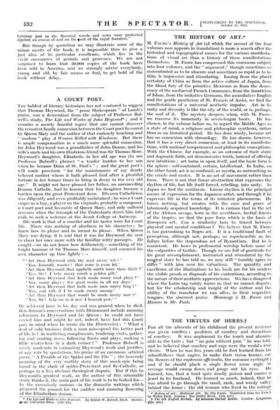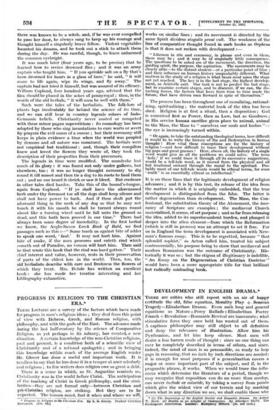THE VIRTUES OF HERBS.f FOR all the ailments of his
childhood the present reviewer was given comfrey : poultices of comfrey and decoctions of comfrey. It was unpleasant to the touch and abomin- able to the taste ; but " no gain without pain " he was told, and lie believed that comfrey and sage were the world's true elixirs. When he was five years old he first learned from his schoolfellows that eagles, to make their vision keener-, cat the flowers of the euphrasia offieinalis, the common eyebright ; and if he should pluck a single flower some eagle in revenge would swoop down and gouge out his eyes. He learned, too, that a toad spits deadly poison and carries a jewel in its forehead. He learned so much, indeed, that he was afraid to go through the small, rank, and weedy valley behind the house : the old woman who lived in the cottage * History of Art : Mediaeval Art. By Elle Faure. Translated from the French by Walter Pach.. London: The Bodley Head. [25s. net.] t The Old English Herbals. By Rdeanour Sinclair Rohde. London : Longman* we. net.1
there was known to be a witch, and, if he was- ever compelled to pass her door, he always sang to keep up his courage and thought himself a singularly brave fellow. Violent vegetables haunted his dreams, and he took out a stick to attack them during the day. He was careful, though, to leave unharmed the common eyebright.
It was much later (four yeas ago, to be precise) that he learned how to revive drowned flies ; and it was an army captain who taught him: " If you sprinkle salt on a fly that's been drowned for hours in a glass of beer," he said, " it will come to life again, wipe its wings, and fly away." The captain had not tried it himself, but was assured of its efficacy. William Copland, four hundred years ago, advised that the flies should be placed in the ashes of pennyroyal ; then, in the words of the old herbals, " it will soon be well with them."
Such were the tales of the herbalists. The folk-lore of plants lags incalculably far behind the science of its time, and we can still hear in country legends echoes of 'ado- Germanic beliefs. Christianity never 'ousted or competed with these minor pagan superstitions : fts cosmology has been adopted by those who sing incantations to cure warts or avert by prayers the evil omen of a sneeze ; but their ceremony still keeps in plain evidence a time when the world was peopled by demons and all nature was unnatural. The herbals were not empirical but traditional ; and, though their compilers knew and loved the flowers they wrote of, they took the description of their properties from their precursors.
The legends in time were modified. The mandrake lost much of its glory : it was found not only under gallows, but elsewhere, too ; it was no longer thought necessary to dig round it till sunset and then tie a dog to its roots to haul them out ; and no one heard it shriek or saw it bleed. But credence in other tales died harder. Take this of the hound's-tongue, again from Copland. " If ye shall have the aforenamed . herb under thy foremost toe all the dogs shall keep silence and shall not have power to bark. And if thou shalt put the aforesaid thing in the neck of any dog so that he may not touch it with his mouth he shall be turned always round about like a turning wheel until he fall unto the ground as dead, and this hath been proved in our time." There had always been some degree of incredulity. In the first herbal we know, the Anglo-Saxon Leech Book of Bald, we find passages such as this :—" Some teach us against bite of adder to speak one word,. find.' It may not hurt him. Against bite of snake, if the man procures and eateth rind which cometh out of Paradise, no venom will hurt him. Then said he that wrote this book that the rind was hard gotten." Their chief interest and value, however, rests in their preservation of parts of the oldest lore in the world. Then, too, the old herbalists describe with care and freshness the flowers of which they treat. Mrs. Rohde has written an excellent book : she has made her treatise interesting and her bibliography exhaustive.



































































 Previous page
Previous page